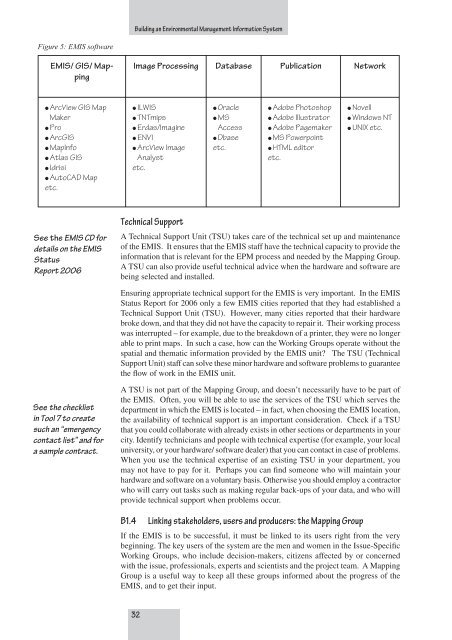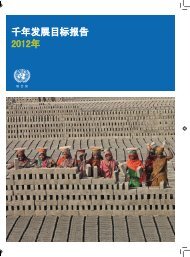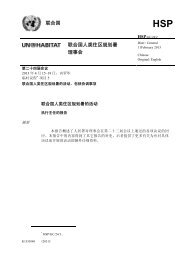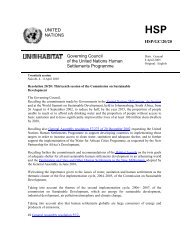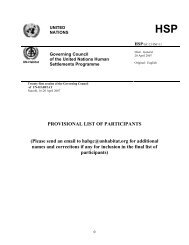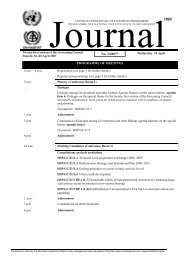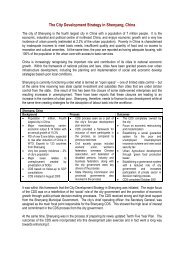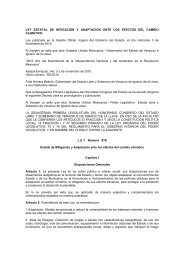EMIS - UN-Habitat
EMIS - UN-Habitat
EMIS - UN-Habitat
You also want an ePaper? Increase the reach of your titles
YUMPU automatically turns print PDFs into web optimized ePapers that Google loves.
�����������������������<br />
<strong>EMIS</strong>/ GIS/ Mapping<br />
��ArcView GIS Map<br />
Maker<br />
��Pro<br />
��ArcGIS<br />
��MapInfo<br />
��Atlas GIS<br />
��Idrisi<br />
��AutoCAD Map<br />
etc.<br />
See the <strong>EMIS</strong> CD for<br />
details on the <strong>EMIS</strong><br />
Status<br />
Report 2006<br />
See the checklist<br />
in Tool 7 to create<br />
such an “emergency<br />
contact list” and for<br />
a sample contract.<br />
Building an Environmental Management Information System<br />
Image Processing Database Publication Network<br />
��ILWIS<br />
��TNTmips<br />
��Erdas/Imagine<br />
��ENVI<br />
��ArcView Image<br />
Analyst<br />
etc.<br />
Technical Support<br />
32<br />
��Oracle<br />
��MS<br />
Access<br />
��Dbase<br />
etc.<br />
��Adobe Photoshop<br />
��Adobe Illustrator<br />
��Adobe Pagemaker<br />
��MS Powerpoint<br />
��HTML editor<br />
etc.<br />
��Novell<br />
��Windows NT<br />
��<strong>UN</strong>IX etc.<br />
A Technical Support Unit (TSU) takes care of the technical set up and maintenance<br />
of the <strong>EMIS</strong>. It ensures that the <strong>EMIS</strong> staff have the technical capacity to provide the<br />
information that is relevant for the EPM process and needed by the Mapping Group.<br />
A TSU can also provide useful technical advice when the hardware and software are<br />
being selected and installed.<br />
Ensuring appropriate technical support for the <strong>EMIS</strong> is very important. In the <strong>EMIS</strong><br />
Status Report for 2006 only a few <strong>EMIS</strong> cities reported that they had established a<br />
Technical Support Unit (TSU). However, many cities reported that their hardware<br />
broke down, and that they did not have the capacity to repair it. Their working process<br />
was interrupted – for example, due to the breakdown of a printer, they were no longer<br />
able to print maps. In such a case, how can the Working Groups operate without the<br />
spatial and thematic information provided by the <strong>EMIS</strong> unit? The TSU (Technical<br />
Support Unit) staff can solve these minor hardware and software problems to guarantee<br />
the flow of work in the <strong>EMIS</strong> unit.<br />
A TSU is not part of the Mapping Group, and doesn’t necessarily have to be part of<br />
the <strong>EMIS</strong>. Often, you will be able to use the services of the TSU which serves the<br />
department in which the <strong>EMIS</strong> is located – in fact, when choosing the <strong>EMIS</strong> location,<br />
the availability of technical support is an important consideration. Check if a TSU<br />
that you could collaborate with already exists in other sections or departments in your<br />
city. Identify technicians and people with technical expertise (for example, your local<br />
university, or your hardware/ software dealer) that you can contact in case of problems.<br />
When you use the technical expertise of an existing TSU in your department, you<br />
may not have to pay for it. Perhaps you can find someone who will maintain your<br />
hardware and software on a voluntary basis. Otherwise you should employ a contractor<br />
who will carry out tasks such as making regular back-ups of your data, and who will<br />
provide technical support when problems occur.<br />
B1.4 Linking stakeholders, users and producers: the Mapping Group<br />
If the <strong>EMIS</strong> is to be successful, it must be linked to its users right from the very<br />
beginning. The key users of the system are the men and women in the Issue-Specific<br />
Working Groups, who include decision-makers, citizens affected by or concerned<br />
with the issue, professionals, experts and scientists and the project team. A Mapping<br />
Group is a useful way to keep all these groups informed about the progress of the<br />
<strong>EMIS</strong>, and to get their input.


